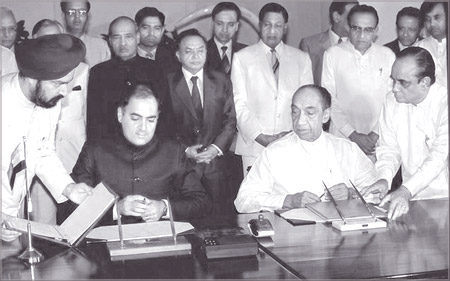 |
exposť |
A part of a larger secret package:
India gave LTTE Rs. 50 lakhs as compensation
|

The signing of the Indo-Lanka Pact in 1987
|
Did India compensate the LTTE after the 1987 Indo-Lanka pact and the
dispatch of Indian Peace Keeping Force (IPKF) to Sri Lanka? The US
administration believed so, according to a cable sent by its embassy
here and released by Wikileaks.
A cable dated April 5, 1988 cites newspaper reports, which quoted
J.N. Dixit, then Indian envoy to Sri Lanka that a stipend was agreed
upon and was to be paid to the LTTE by the Indian government in view of
the tax loss it suffered after IPKF was sent. The US cable said Rs. 50
lakh was the compensation paid to the LTTE in July 1987 and only one
payment was made before September that year when LTTE walked out of the
deal over its participation in the interim council.
An unnamed LTTE spokesman in Madras is quoted as saying that the
payment was part of a larger secret package of guarantees, which Prime
Minister Rajiv Gandhi offered LTTE leader V. Prabhakaran in July 1987 to
get him to agree to the bilateral accord, said the cable.
"We were in the jungles when the amount was said to have been paid to
the LTTE. There was no communication from the ministry of external
affairs to us about the payment made to get Prabhakaran to agree to the
terms.
It must have been a move by the Research and Analysis Wing (RAW),"
said Col. (retd) R. Hariharan, an analyst of Sri Lankan affairs, who
served in the IPKF.
Other features of the package for the LTTE included an assurance of
an offer of 7 out of 12 seats to enable it to form a majority in the
interim provincial council in the north and east of Sri Lanka. India
said it would route Rs. 1 billion through the interim council to
rehabilitate Jaffna besides $40million that was agreed upon by New Delhi
at an earlier consortium meeting in Paris. The Indian government also
promised to develop a police force after the formation of the interim
council. Despite all this, the deal fell through almost the same day,
said the cable.
As a parting shot, the embassy expressed doubt over the agreement
itself. It said, "Left unsaid is an indication whether the package
suggested above is still on the table in India-LTTE talks, which
apparently have been going on for some time." Quoting a BBC
correspondent, the cable said talks between the LTTE and India began in
Madras in February 1988, but fell through a week later.
Courtesy: Times of India
CM went out of his way to demonstrate
Tigers'commitment:
LTTE could have threatened Karunanidhi, says US
Tamil Tigers might have threatened the then Chief Minister, M.
Karunanidhi, in 1989 "with a significant increase in the level of
militant violence in Tamil Nadu" if he did not "boost their cause," the
United States surmised.
"While all agree that it would be counter-productive for Karunanidhi
to continue overt support for the several losers among the Sri Lankan
Tamil political groups, his energetic and unwavering and totally
uncritical agreement with the LTTE's every move is raising numerous
eyebrows, and alienating members of his own party...
One extreme view, to which we do not subscribe, is that Karunanidhi
is interested in a Tamil Eelam variant for his Indian state.
Another, perhaps more credible theory is that the LTTE has threatened
Karunanidhi with a significant increase in the level of militant
violence in Tamil Nadu, enough perhaps to lead to the imposition of
President's rule, if he doesn't boost their cause," says a cable from
the U.S. Consulate in Chennai to its Embassy in New Delhi and the State
Department (90MADRAS1249_a, CONFIDENTIAL).
In its heyday after 'driving' out the Indian Peace Keeping Force, and
burning bridges with friends in New Delhi and Colombo, the gun-toting
Tigers had a free run in Tamil Nadu, till they over-reached themselves
with the killing of former Prime Minister Rajiv Gandhi.
The cable speculates if Mr. Karunanidhi was becoming the LTTE's elder
statesman, and details the understanding of the U.S. Consulate of the
situation which led to Mr. Karunanidhi's change of stance.
Citing Mr. Karunanidhi's stance against the Indian Peace Keeping
Force, his spin on the LTTE abducting Tamil Nadu fishermen and his
futile but persistent attempts at forging unity among the fratricidal
militant Tamil groups in Sri Lanka, the cable concludes that "the Chief
Minister has gone out of his way to demonstrate his commitment to the
Tigers - at what would appear to be significant political cost.
No political figure here, least of all from the DMK, can explain to
anyone's satisfaction the gamebook Karunanidhi is using.
As he becomes more and more of a 'Tamil Eelam hardliner', some may
feel he is burning bridges with Delhi. We are at present baffled."
Noting correctly that the LTTE "had never been Karunanidhi's
favourite Sri Lankan Tamil militant group, principally because of their
close ties with his arch-rival, the late M.G. Ramachandran," the cable
says Mr. Karunanidhi's about-turn came soon after "mediation talks began
in December, and specifically discussions between the LTTE's Anton Bala-
singham and Karunanidhi."
After this, "the chief minister chose to ignore the other groups,
advising them to bury their differences with the LTTE and support their
obvious power position and assist in developing a viable Tamil political
environment."
When the cable was brought to the attention of a Dravida Munnetra
Kazhagam functionary, the leader responded that the U.S. and others were
free to have their points of view. The DMK had stood for Tamil rights in
Sri Lanka, and it had been dismissed from power too.
Courtesy: The Hindu
|


